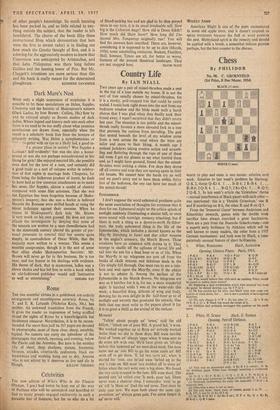Dark Mare's Nest
WITH only a slight suspension of scepticism it is possible to let these speculations on Helen, Sappho, Cleopatra and the heroine of Shakespeare's sonnets (Dark Ladies, by Ivor Brown : Collins, 18s.) flow by and be enjoyed simply as Brown studies of dark ladies. Where legend and history melt into each other there is no need to be too stuffy about what premises conclusions are drawn from, especially when the result is a scholarly book free from the horrors of schotarly writing. Was Helen a nymphomaniac or
-ft-getter with an eye to a likely lad, a good in- a proper place in society? Was Sappho a Lesbian? Self-evidently : but was she also a homo- sexual or was she not perhaps misunderstood in her liking for girls? She enjoyed married life, she possibly even died for the love of a man, and certainly did a good trade as a sort of calypso writer in celebra- tion of first nights in marriage beds. Cleopatra, far from being the lecherous product of incest, he finds to have had so few amorous attachments as to make her seem, like Sappho, almost a model of chastity compared with some film actresses. That she was not Egyptian has been forgotten because of Shake- speare's imagery; that she was a harlot is believed because the Romans were skilled hands at using the smear technique against their enemies. When he comes to Shakespeare's dark lady Mr. Brown is very much on 'his own ground. He does not com- plicate the investigation by denying that some of the sonnets are written to a man (bowdlerisers had in the nineteenth century altered the gender of per- sonal pronouns to conceal this) but asserts quite simply, in contradiction of Oscar Wilde, that the majority were written to a woman. This seems a sensible compromise, though it is the sort of sense that often eludes Shakespearian theorists: Mr. Brown will never go far in this business. He is too sane, and too honest in his•dealings with evidence. His theme of dark, that is mysterious, ladies was a clever choice and has led him to write a book which an old-fashioned publisher would call 'instructive


































 Previous page
Previous page